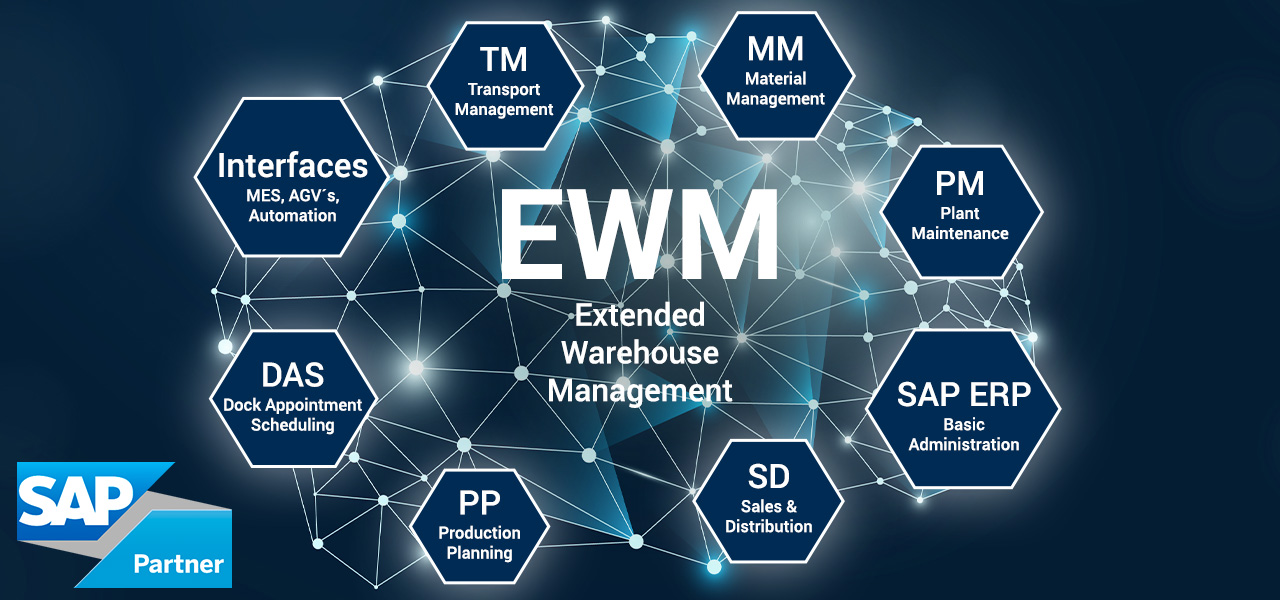SAP integration from LOGSOL – your experts for logistics optimization

LOGSOL offers you comprehensive SAP integration with a clear focus on SAP S/4HANA EWM (Extended Warehouse Management). Benefit from our expertise to improve your logistics processes through precise implementation of SAP S/4HANA EWM and related SAP logistics modules.
Your benefits of SAP EWM consulting with LOGSOL
Our SAP EWM consulting supports you in the introduction of customized solutions for your logistics processes and accompanies you in the digital transformation of your warehouse management.

Your projects in safe hands
- Certified SAP consultants
- Extensive project experience
- Holistic, process-driven consulting
- Technical know-how
- Always up to date
- Transparent project costs
- Support beyond the project period
- Risk minimization
- Long-term competitive advantage
Efficient logistics with SAP EWM - Our know-how, your benefit
As an SAP consulting company, we support you throughout your project, from strategy development and concept design through to successful implementation in your warehouse.
LOGSOL als SAP EWM-Berater
Responsibility for
- Creation of process descriptions and specifications
- Coordination between customer and SAP integrator
- Support for system tests and implementation processes
Services
- Workshops to record requirements and optimize processes
- Creation of requirement and functional specifications
- Support with tests and documentation
- Training and change management
LOGSOL as SAP EWM integrator
Responsibility for
- Technical implementation and customizing
- Execution of tests, implementation of authorization concepts
- Support with go-live and hypercare
Services
- Analysis of requirements and process design
- Creation of technical and functional specifications
- Configuration and customization of SAP systems
- Data migration, integration and test planning
SAP EWM: The ideal solution for modern warehouse logistics
SAP EWM is an adaptable system that grows with your requirements. Whether your warehouse is growing in size or complexity, SAP EWM offers the right solution. We have summarized important advantages and functions for you:
Improved warehouse management
Integration with other SAP solutions
Real-time transparency
Scalable and flexible
Warehouse management and space optimization
Comprehensive warehouse mapping: From automatic high-bay racking to individual fixed storage locations
Fine-grained inventory management: Detailed control at the level of individual storage bins
Goods movements
Comprehensive process coverage: From goods receipt to delivery and stock transfers
Versatile functions: Automatic replenishment, hazardous materials management, picking, resource optimization
Manage workstations
Process optimization: Simplified workflows thanks to adapted interfaces
Customizable workstations: Units such as packing, quality inspection and counting can be mapped and personalized
Inventory
Comprehensive inventory functions: Zero check, automatic write-off, low stock check, difference monitor, handling units
Flexible options: Storage bin and product-related inventories
Monitoring and planning
Control: Automatic reporting of critical processes, monitoring functions
Holistic solution: planning, monitoring and control of warehouse processes
Connection of radio data transmission
Mobile data capture: real-time communication between SAP and RF devices
Barcode support: verification and capture of data via barcodes
Maximize your efficiency with professional SAP integration and EWM consulting!
I am happy to answer any questions you may have about SAP S/4HANA EWM!
Here you can find our privacy policy.
The most frequently asked questions and answers about SAP EWM
What distinguishes SAP S/4HANA Stock Room Management from SAP EWM?
Stock Room Management is suitable for simple, standardized warehouse processes without a high level of automation. SAP EWM, on the other hand, offers advanced functions such as HU management and material flow control for complex and automated warehouse processes.
When do you use EWM-Basic and when EWM-Advanced?
EWM-Basic is ideal for smaller warehouses with standard requirements and is directly integrated into SAP S/4HANA. EWM Advanced is suitable for large, complex warehouses with a high level of automation and offers additional functions such as material flow and yard management.
Embedded or decentralized? Which solution is better?
EWM Embedded is cost-efficient and ideal for companies using SAP S/4HANA. Decentralized offers more flexibility and is better suited to distributed, complex warehouse systems, but requires more effort to implement.
Which IT architecture is suitable - cloud or on-premise?
Cloud solutions score points with their rapid scalability and minimal maintenance requirements. On-premise solutions offer maximum control and flexibility, but require dedicated IT resources. By focusing on cloud solutions, SAP is driving digital transformation and offering companies a future-oriented platform for more efficient business processes.
Which training approaches are suitable for software implementation?
Train-the-Trainer trains key users who pass on their knowledge internally – and ensures long-term expertise. End-user training courses are aimed directly at users and convey practical content. The choice depends on the respective requirements.
Which implementation method is better - big bang or step-by-step?
The big bang approach switches all functions live at once, which is fast and cost-efficient, but carries a higher risk of instability. The step-by-step approach introduces the system gradually. This takes a little longer, but involves gradual optimization and a lower risk.
Are system-controlled or user-controlled processes a better fit?
System-controlled processes offer maximum efficiency and standardization, ideal for clear workflows. User-guided processes are more flexible and suitable for dynamic environments, but carry the risk of quality deviations.
Which project methodology is more suitable - agile or waterfall?
Agile methods offer flexibility and quick adjustments through iterative processes, ideal for dynamic projects. The waterfall model is linear and structured, suitable for projects with clear, stable requirements and predictable processes.
